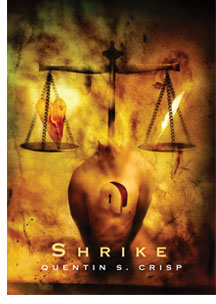 |
 Quentin Crisp
Quentin Crisp
Shrike
Reviewed by: Mario Guslandi © 2009
PS Publishing
UK First Edition Hardcover
ISBN: 978-1906301378
Publication date: February
102 pages; £10/$15
Date reviewed: 01-08-2009
Index: General-Fiction
Horror
Fantasy
After a long hiatus since his last short story collections (the superb 'Morbid Tales' and the disappointing 'Rule Dementia!') Quentin Crisp makes his debut as a novelist with a short novel which is not really a novel but rather a tormented, longish story which is not a story.
Crisp is an exquisite literary stylist whose work defies any attempt to put genre labels on it, altough, to some extent, he can be considered a fantasist like, for instance, Jeffrey Ford (but don’t get me wrong, the two writers have precious little in common).
To me Crisp is also the exception to my personal belief that a good writer should be, first of all, a good storyteller.
Plots and characters, in Crispin's 'stories' have only marginal importance (if any), whereas wording and introspection, meditation about himself and the surrounding world are the things that really matter. In a way, reading Crisp's stuff is not an easy task (his books are not the type to be taken along on a bus ride or to be consumed on a crowded beach), on the other hand browsing his work is like savouring a delicious vintage wine to be enjoyed sip by sip.
Thus, while I'm somehow a bit disappointed because I'm always expecting by his extraordinary talent the great masterpiece that he's been unable to produce so far, when I turn the last page of one of his pieces I feel slightly intoxicated and still longing for more.
With this particular book I confess I was on the verge of quitting after the first ten pages because of the sense of tedium and frustration I was experiencing, but in the end I was sorry that the book is only 102 pages long. I think Crisp is fated to generate debate, to spellbind but irritate like great artists often do.
But now to the present novel. It's about Brett, a young Englishman going back to Japan to attend the funeral of an old friend and, ostensibly, to take a four-week break in order to devote himself to writing. A guest of the aged widow, Brett actually spends most of his time brooding over a lost lover, Heather, whom he has left for no clear reason. Obsessed with the presence of a shrike, an elusive bird inhabiting the house garden and quickly becoming a symbol of that death he desires and fears at the same time, haunted by vivid and distressing dreams, the man is tormented by his failures and his inability to cope with reality ( "I am pierced by this thorn and this is what I would speak. If only I could speak in thorns, not words, could speak the torn that pierces me, how would it sound?").
The ending remains ambiguous and we wonder what Brett's life will be when he returns home.
All in all, the novel appears to be similar to the work of the obscure Japanese writer Tayama Katai (extensively quoted in the book when describing Brett's visit to the museum dedicated to that artist), founder of the I-novel, a Japanese literary form where nothing really happens. No wonder Crisp, who has been always pursuing the elegance of the literary form more than the substance of fictional events, feels a kind of affinity to his fellow writer.
Crisp's deep knowledge of Japanese culture provides an unusual background and an exotic atmosphere to the familiar subject of the young man struggling to face the difficulties of life, a recurring (autobiographical?) theme in his fiction.
It's hard to guess what direction Crisp’s literary output will take in the future. Once again he exhibits a polished prose full of lyricism and a perceptive, sensitive view of the mysteries of human existence in a dreadful universe.
His potential as a writer is enormous but his promise still remains to be fulfilled.
|
 |
